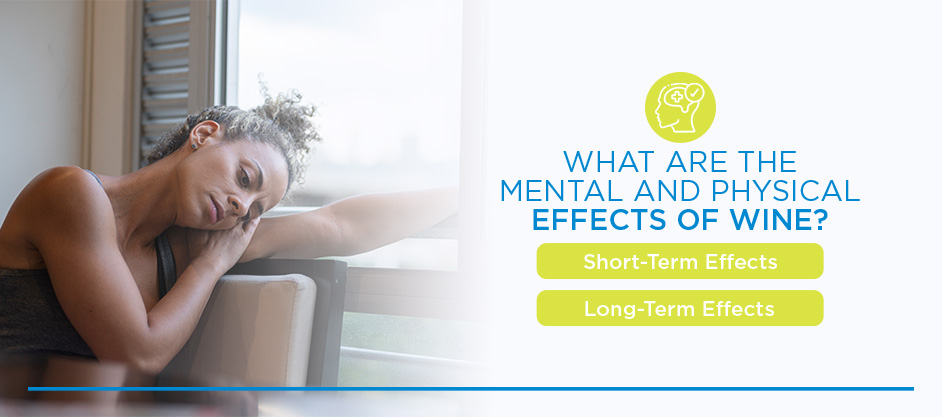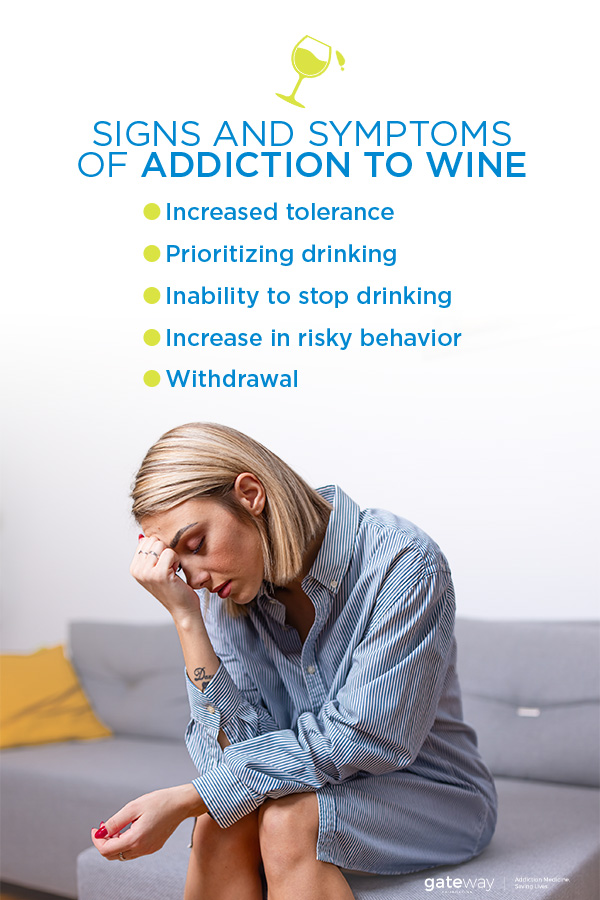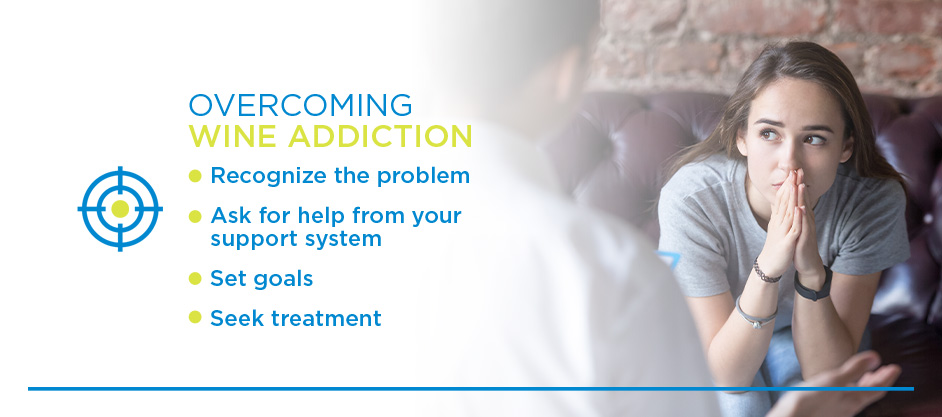- May 20
- Addiction
Can you develop a wine addiction? The answer is yes. While excessive drinking is more often associated with beer or liquor, wine is still a type of alcohol. A five-ounce glass of wine contains the same amount of alcohol as a 12-ounce glass of beer or 1.5 ounces of liquor. When evaluating your alcohol consumption, it’s not about whether you drink wine or liquor. It is about how much alcohol you are consuming.
Moderate drinking means one drink per day for women and two drinks per day for men. When you start to consume more than moderate amounts, your drinking habit is characterized as binging. How much wine is too much? What are the common wine addiction symptoms? Learn more about the long-term effects of drinking wine every day and how to stop drinking wine.
What Are the Mental and Physical Effects of Wine?
Consuming alcohol affects the body and mind. People enjoy drinking because these effects can be pleasurable, but it’s important to understand the potential short-term and long-term consequences of alcohol consumption.
Short-Term Effects
How drinking wine will affect you depends on factors like how much you drink, your body weight and your alcohol tolerance. In the short-term, wine can lead to:
- Relaxation and drowsiness: Many people enjoy drinking because it can lead to a relaxed feeling, which can lend itself to an enjoyable social atmosphere. Wine can also make you feel drowsy, which is another reason people use it to unwind after a long day.
- Impaired judgment: Drinking alcohol, including wine, lowers your inhibitions and can alter your decision-making process and behavior.
- Impaired movement and speech: If you consume enough wine to become drunk, you will likely experience impaired coordination and slurred speech. You may also have blurred vision. Intoxication can make you make you feel dizzy and unable to stand upright.
- Increased blood pressure: Drinking wine can cause a temporary increase in your blood pressure, usually after consuming more than three drinks.
- Blackouts and unconsciousness: Depending on how much wine you drink, drowsiness can evolve into blackouts and unconsciousness. Blackouts refer to gaps in your memory caused by drinking alcohol, and they can be fragmentary or complete. They typically begin when your blood alcohol concentration reaches at least 0.16 percent. Fragmentary blackouts are characterized by intermittent periods of memory and missing time. Complete blackouts occur when you have no memory of several hours at a time. You might still be able to talk and interact with your environment during a blackout. It is also possible to drink enough wine that you lose consciousness.
- Hangovers: After a night of indulging in some wine, you may wake up the next morning feeling off. Hangovers are one of the unpleasant consequences of excessive drinking. The symptoms of a hangover include headache, light and sound sensitivity, thirst, fatigue, nausea, body aches and poor sleep. Frequent hangovers can affect your relationships and your performance at work.
Long-Term Effects
The effects of drinking wine every night can lead to long-term consequences, such as:
- High blood pressure: While a few drinks once in a while might mean a temporary increase in blood pressure, consistent binge drinking can be a risk factor for unhealthy high blood pressure. Long-term, excessive drinking can also affect the muscles of your heart and increase the risk of stroke. Excessive consumption of wine can also contribute to weight gain, which can increase the risk of heart disease.
- Memory loss: Even a single episode of binge drinking can lead to blacking out and having no memory of events while intoxicated. You may also struggle with concentration. Over time, excessive consumption of alcohol, like wine, can lead to long-term memory loss. Long-term alcohol abuse, excessive drinking over the course of many years, can lead to brain damage. Alcohol-related brain damage can impair memory, decision making and the ability to live daily life without assistance.
- Liver damage: Chronic alcohol abuse can have a serious impact on the liver. Over time, you are at risk of developing fatty liver disease, alcoholic hepatitis and cirrhosis. Nearly all heavy drinkers will develop fatty liver disease at some point. Additionally, up to 35 percent will develop alcoholic hepatitis, and up to 20 percent will suffer from cirrhosis.
- Increased risk of cancer: Alcohol has been linked to an increased risk of certain types of cancer, including breast, liver, colon, larynx, esophageal and mouth and throat.
Is Wine Addictive?
Excess wine consumption can lead to addiction. It does not matter if you are drinking red wine, white wine or any other type of alcohol. Understanding alcohol by volume (ABV), serving sizes and frequency of drinking is more important than what type of alcohol you choose to consume. Five ounces of wine has approximately 12 percent ABV, while 12 ounces of beer has about 5 percent ABV. A higher ABV means you are consuming more alcohol. If you consume enough alcohol on a regular basis, you can develop a dependence.
Risk factors for addiction to wine, or other types of alcohol and substances, include:
- Family history: Your family history can play a role in developing an alcohol addiction. If you have a parent or another close relative who has an alcohol addiction, heavy drinking may be more normalized for you. Additionally, your genetics can also be a factor in developing an addiction.
- Mental health issues: Mental illness can often occur in tandem with substance abuse. People who suffer from conditions like anxiety, depression, bipolar disorder, post-traumatic stress disorder (PTSD) and borderline personality disorder may try to use drinking as a coping mechanism. Approximately half of those who have a mental illness will also experience some kind of substance abuse disorder at some point.
- Environmental factors: Your surrounding environment can play a significant part in your risk for developing an alcohol addiction as well. For example, someone who is a part of a social circle that normalizes and prioritizes binge drinking is more likely to participate in the same behavior patterns.
Signs and Symptoms of Addiction to Wine
Wine addiction does not happen overnight. When drinking wine is a regular part of your life, it can be difficult to step back and recognize the signs of addiction, such as:
- Increased tolerance: After regular, heavy drinking, your body begins to build up a tolerance to alcohol. You may find that you need to pour another glass of wine or open another bottle to achieve the same pleasurable effects. That increased tolerance can lead to drinking more often and consuming higher quantities.
- Prioritizing drinking: Enjoying wine might be nothing more than something you do occasionally with family and friends over a good meal or after a stressful day at work. However, when drinking starts to interfere with your daily life and responsibilities, you may need to take a look at your behavior. Is your drinking affecting your performance at work? Are your personal relationships suffering? If you continue to drink despite those issues, you may be struggling with an addiction.
- Inability to stop drinking: An inability to stop drinking is another strong indicator of addiction. Maybe you have recognized that your wine drinking is affecting you and your family. Maybe you have decided to cut back your intake only to find that you are unable to reduce or stop your drinking. If you find yourself reaching for the glass or bottle even though you would rather not, you may need help.
- Increase in risky behavior: Alcohol consumption lowers your inhibitions. When you develop an addiction, you may find that risk-taking behavior becomes a normal part of your life. Behaviors like drunk driving or unsafe sex can become an issue when someone struggles with addiction.
- Withdrawal: Withdrawal is an unequivocal indication of addiction. If you do stop drinking only to experience symptoms like difficulty thinking clearly, headache, tiredness, shakiness and clammy skin, you are experiencing withdrawal. It is unpleasant, and in some cases, it can be dangerous. The physical feelings associated with withdrawal can make it extremely difficult to quit drinking, even if you know you’re dealing with an addiction.
The signs of wine addiction may be easy for you and your loved ones to recognize, or they can be more subtle. Just because you still feel like you’re in control of your life doesn’t mean that your drinking cannot develop into a problem.
Overcoming Wine Addiction
Addiction is a difficult cycle to break. It takes time and hard work. Here are some steps you can take to help you get started:
- Recognize the problem: The first step to addressing addiction is recognizing that you have a problem. This step may sound easy to take, but for many people, this is a challenge. Wine is often considered to be less harmful than beer or liquor, despite still being an alcoholic beverage. It is easy to brush of a drinking habit as “just wine.” Take a step back and assess your relationship with wine. From there, you can start to think about how you are going to make the necessary changes in your life.
- Ask for help from your support system: Many people are ashamed to be struggling with a wine addiction. So, they might try to quit on their own. It is ok to ask your close friends and family for support. The people who love you will want to see you change your behavior and move toward recovery.
- Set goals: Breaking an addiction is a process. Most people need time to accept the issue and to work on recovery. Understand that you may take a step forward only to take another one backward. Relapse is a normal and expected part of recovery. Be kind to yourself. Set realistic goals and work to achieve them. Don’t give up on yourself if you make a mistake. Your goals are still there and still attainable, even if you have a misstep in the process.
- Seek treatment: For many people, outside treatment is an essential part of breaking addiction. Professional treatment centers have a wide range of resources available to get you the customized care you need to recover from your addiction. With the help of a trusted facility, you can undergo medically supervised withdrawal and access the medication and therapy you need to embrace sobriety.
Take the First Step
Addiction is a complex condition that affects many individuals and families. Whether you are addicted to wine or any other kind of substance, help is available for you and your loved ones. At Gateway Foundation, we understand that everyone’s experience with addiction is different. Our evidence-based services are designed to help you overcome alcohol addiction in whatever way best fits your needs. If you or a loved one needs help overcoming a wine addiction, reach out to us so we can take the first step together.






